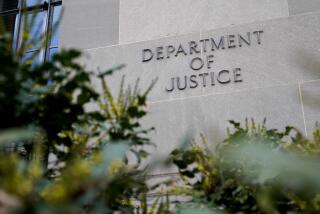Fraud Probers Face Problem of Getting to Bigger Targets
- Share via
WASHINGTON — The first indictments and pleas in the Pentagon fraud probe reflect the classic prosecution strategy of building a major case block-by-block, obtaining criminal admissions from those at the bottom of an alleged conspiracy to use against those higher up.
But they leave unanswered whether prosecutors will be able to move from what appears to be one largely self-contained “pocket of corruption,” as one investigator put it, to the bigger government and industry targets whose names surfaced when the investigation first became public.
Aside from defense consultant William L. Parkin, a central defendant in Friday’s long-delayed charges, none of those who were accused or pleaded guilty appear able to help prosecutors assemble evidence against the other suspected networks of consultants, contractors and defense officials said to be involved in the scandal.
Investigators believe that at least three distinct chains of officials and businessmen trafficked illegally in inside information on key defense contracts being scrutinized in the probe. It is not clear whether those in any single group have significant knowledge of the allegedly illicit actions on the other projects.
More Evidence Needed
Therefore, to make a significant breakthrough in the case, prosecutors will have to gather enough evidence on additional suspects in the other alleged networks--enough to force some to plead guilty and offer cooperation against their colleagues--to produce criminal cases on high-ranking figures under suspicion.
Investigators are struggling to compel direct testimony from key figures needed to corroborate the crimes they suspect based on voluminous wiretapping of principals.
Some progress on this challenge has been made, sources familiar with the investigation said Friday. “There could be (additional) guilty pleas in a few weeks, but they’re off in a different area,” one source said.
The guilty plea obtained Friday from Michael Savaides, a former marketing representative for Teledyne Electronics’ Arlington, Va., branch typifies the block-building approach of federal investigators.
He faces up to five years in prison and a fine of $250,000 for conspiracy to commit bribery, but prosecutors have agreed to inform the sentencing judge of his cooperation. For his part, Savaides promised to disclose all information he may have on any aspect of Operation Ill Wind. If he omits any material fact, he can be prosecuted for perjury, obstruction of justice and other charges.
But, government sources believe, Savaides’ knowledge of possible criminal activity does not extend beyond the activities of Teledyne or others.
More to Read
Sign up for Essential California
The most important California stories and recommendations in your inbox every morning.
You may occasionally receive promotional content from the Los Angeles Times.












